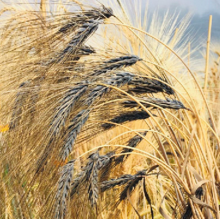A multi-million pound programme of strategic research delivered over five years providing science and evidence to support policymakers and its partners. Informed by strong partnerships and the needs of a broad range of stakeholders. Science at the heart of society contributing to the health, wealth and wellbeing of Scotland and beyond.
You are here
Research
Ongoing research (2022-2027)
This project provides new approaches for reducing greenhouse gas emissions (GHG) from agriculture and land use in Scotland, establishes a database of management activities contributing to the mitigation of GHG emissions, investigate new approaches to GHG mitigation, and assess the potential for land management activities to contribute to carbon sequestration. Engagement with stakeholders will explore barriers to uptake of mitigation measures.
- Agricultural Greenhouse Gases
- 2022-2027

This project evaluates whether whole grain phytochemical-rich barley accessions developed from ancient grain (for improved climate credentials) can produce a significant change in blood sugar levels to complement the established lipid lowering health claims related to barley β-glucan. This project supports new food and drink market opportunities and promotes barley as a healthy and sustainable crop.
- Human Nutrition
- 2022-2027
This project observes ‘living lab’ case studies in rural and island Scotland with a focus on dominant industries analysed through an innovative blend of micro- and macroeconomic concepts and methodologies to map an understanding of circular economy drivers and barriers such as behaviours (willingness) and socio-economic capacity i.e., technologies and green skills (readiness) under alternative scenarios depicting regional circular economy paths.
- Circular Economy & Waste
- 2022-2027
This project delivers underpinning and integrated research for: (i) emission factor updates and activity data, (ii) the development of a specific Peatland Monitoring Framework, (iii) improved Natural Capital accounting, further development of the Peatland Code, and (v) improved carbon auditing tools that include climate risk assessments.
- Soils
- 2022-2027
Changing environmental conditions necessitate adaptations in Scottish agriculture. This project investigates the development of crop species that are resilient to combinations of environmental stresses whilst using resources more efficiently. We test the hypothesis that utilisation of latent diversity in crop species can improve both resource efficiency and stress tolerance.
- Crop Improvement
- 2022-2027
Use of precision livestock farming tools is increasing globally. When exploited fully, these can aid farm-level management, improve animal health, welfare and productivity, monitor or reduce emissions, and improve traceability. This project explores current and new digital innovations, key barriers to adoption and solutions, and provide a robust evidence base demonstrating benefits of integrated data use within beef, sheep and dairy systems.
- Livestock Improvement
- 2022-2027
The consumer has a right to know what is contained within the food they eat. Allied to this, there is a significant risk in the food supply chain of fraud where a food is replaced by a cheaper or inferior alternative. This project will develop mass spectrometry-based approaches for determining the provenance of food and beverages. We are developing methods for determining the composition of whisky and meats to ensure their integrity.
- Diet & Food Safety
- 2022-2027
This project investigates how behaviour change at the individual, household and organisational level creates challenges and opportunities for moving to a more circular economy.
- Circular Economy & Waste
- 2022-2027
This project aims to identify the most effective food swaps, based on an individual’s diet, that makes their shopping basket more healthy and environmentally sustainable; and monitor in real-time whether physiological, psychological and environmental factors, at an individual level, affect the adoption of such food swaps and make individual diets healthier and more environmentally sustainable, in young adults.
- Food & Drink Improvements
- 2022-2027
Mycotoxins are toxic fungal contaminants which are often found in cereal foods. This project addressees an important food safety issue, the contamination of cereal foods with mycotoxins which are produced by fungi in agricultural production. This project aims to minimize the risk to consumers from mycotoxin contamination in cereal foods by improving our understanding of the sources of contamination in primary cereal production and processing and by assessing human exposure and risk through biomarker analysis.
- Food & Drink Improvements
- 2022-2027